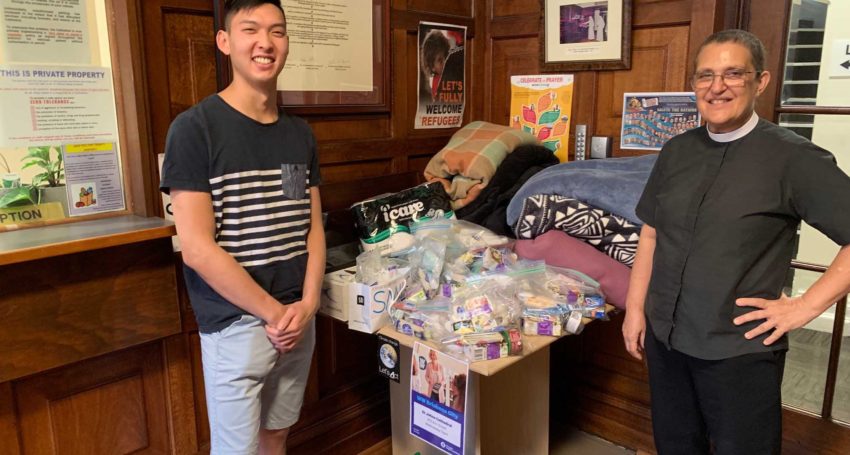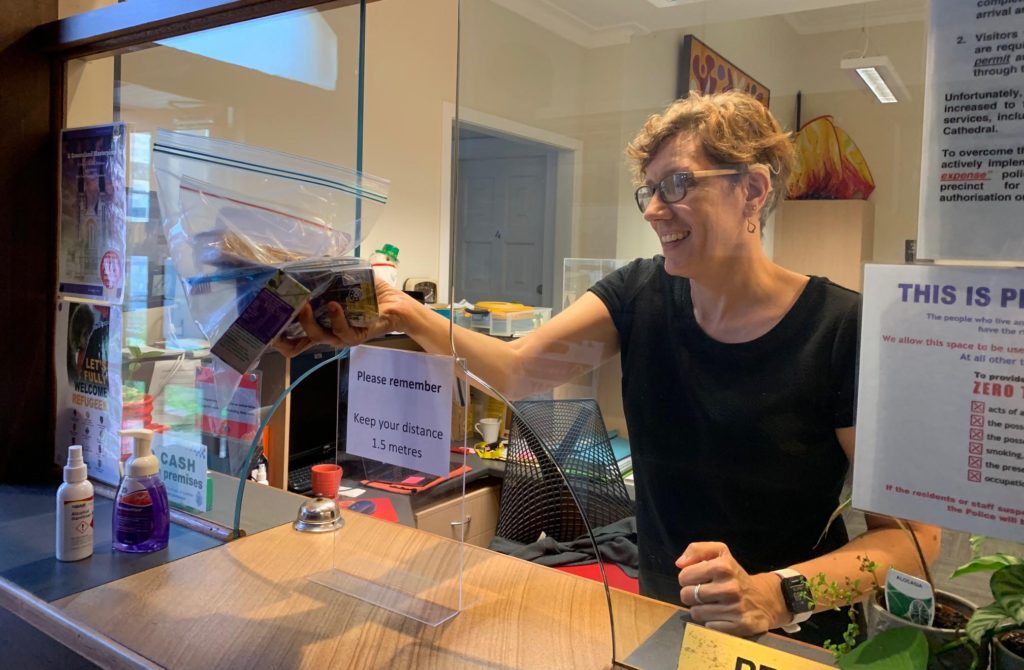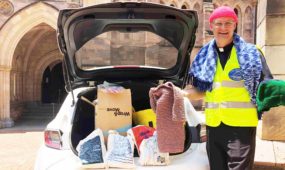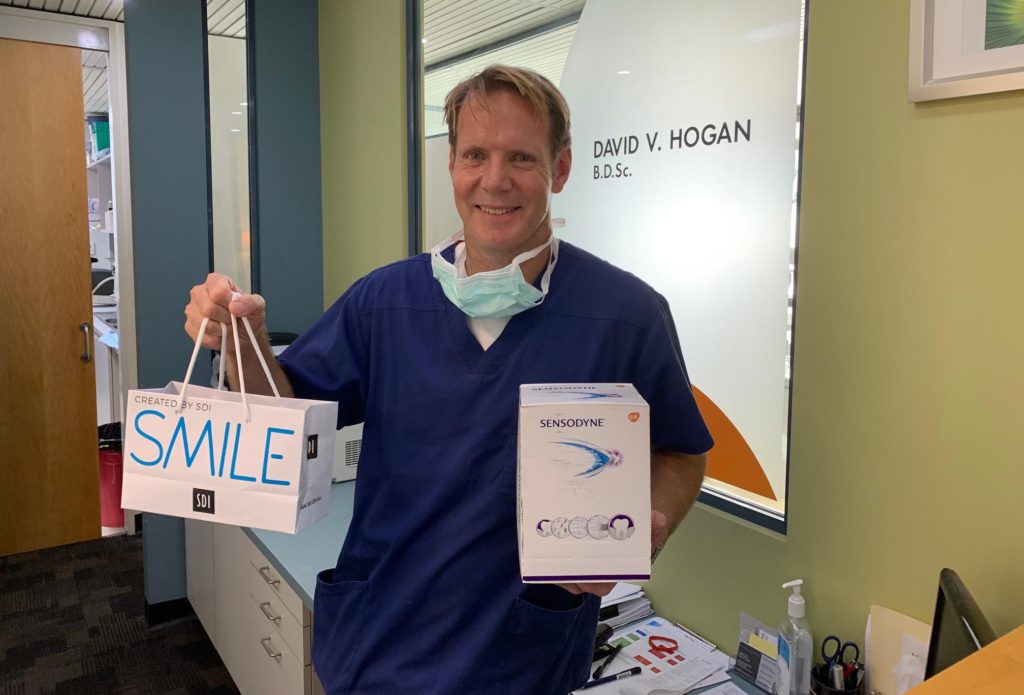A deacon, a dojo and a dentist
Features
“The Rev’d Dr Ann Solari joined forces with a local martial arts dojo and dentist recently to collect supplies and monetary donations for people doing it tougher on our streets in the wake of the temporary closure of many emergency homeless outreach services,” says The Very Rev’d Dr Peter Catt from Resource Church St John’s Cathedral, who also offers helpful community engagement tips

Cathedral deacon The Rev’d Dr Ann Solari joined forces with a local martial arts dojo and dentist recently to collect supplies and monetary donations for people doing it tougher on our streets in the wake of the temporary closure of many emergency homeless outreach services.
Under the auspices of the Queensland Government’s ‘Care Army’, members of the Brisbane Aikikai aikido dojo in Newstead donated $700 in cash, as well as emergency care packages, grocery items, infant supplies and blankets.
Advertisement
Brisbane CBD dentist and Churchie dad David Hogan also donated dozens of toothbrushes and toothpaste tubes for the emergency care packages, adding to the cans of tuna, fruit juice, UP&GO breakfast drinks, protein bars, cutlery and toiletries provided by the dojo.
The Rev’d Dr Ann Solari said that connecting with other organisations to collectively help care for at-risk people in our communities is especially necessary in periods of such critical need.
“At times like this, it is important for community groups, businesses and religious organisations to come together and stand in solidarity with the most vulnerable,” The Rev’d Dr Solari said.
“St John’s Cathedral has a strong commitment to community engagement and working in partnership with like-minded organisations, which helps us to be more effective in the delivery of much-needed services.
“As Anglicans, we are called ‘to respond to human need by loving service’, and one of the best ways we can do this is by consistently interacting with and growing our network of supporters.
“The food and toiletry items provided by the Brisbane Aikikai dojo, along with the toothbrushes and toothpastes donated by Dr Hogan, will enable us to assist 30 additional people with everyday essentials, with the blankets arriving at the perfect time as the nights are starting to get cold.
“The $700 in cash donations will be put to good use and will be used in the coming months for emergency supplies, probably canned food and socks.
“We really appreciate the thoughtfulness of the Newstead-based Brisbane Aikikai dojo members and Churchie parent Dr David Hogan.”

“The food and toiletry items provided by the Brisbane Aikikai dojo, along with the toothbrushes and toothpastes donated by Dr Hogan, will enable us to assist 30 additional people with everyday essentials, with the blankets arriving at the perfect time as the nights are starting to get cold”
In early April, a few dojo individuals connected to the Cathedral asked if other members wanted to donate non-perishable food and toiletries for care packages, as well as blankets, for people who sleep on the Anglican Cathedral grounds.
Brisbane Aikikai dojo cho (‘dojo chief’) Chris Seto-Payne Sensei said that his dojo members responded promptly and generously to the call, with dojo Care Army volunteers coordinating the collection, purchasing and delivery of items.
Advertisement
“In less than a fortnight, dojo members gave enough items for 30 care packages, a week’s worth of groceries and toiletries, including baby food and wipes, for a young family, blankets and $700,” Seto-Payne Sensei said.
“Our aikido members are open spirited and caring, so they were very happy to help.”
Approximately 20,000 Queenslanders experience homelessness at any given time.
Yesterday Anglicare Southern Queensland released its Brisbane Rental Affordability Snapshot, which shows that people on low incomes and government payments are at risk of homelessness, with the private rental market out of reach.
Key findings of the Anglicare snapshot include:
- 1% of rentals are affordable and appropriate for a couple on the Aged Pension.
- 0% of rentals are affordable and appropriate for a person on the Disability Support Pension, a single parent on the minimum wage, or a single person on Newstart or Youth Allowance.
- A single person earning minimum wage would spend more than 50% of their income on rent.
- A young person on Youth Allowance would need to spend 109% of their income on rent, or 70% for a room in a shared property.
Frontline workers have also observed that women aged over 55 are one of the fastest growing groups of people experiencing homelessness in Brisbane.
People experiencing homelessness have been especially affected by COVID-19, with supermarket panic buying impacting the ability for emergency food pantries to purchase food supplies and toiletries leading to an increasing reliance on community members to donate items.
Advocates are concerned about the associated health impacts, with an increasing number of rough sleepers needing to dig through bins after going days without food and unable to access basic hygiene items.
Related Story
 News
News
Scarves for seafarers
Brisbane CBD dentist David Hogan said that he was happy to assist with the Cathedral and dojo’s joint efforts, explaining that it is important for people sleeping rough to take care of their teeth, as dental hygiene and general physical health are interrelated.
“I have been a private practitioner dentist for many years now, but I certainly do not forget my roots having assisted many disadvantaged people, including university patients when I was a dental student in the 80s, public patients at Nambour Hospital in the 90s, NHS patients in London in the early 2000s and flood victims in 2011,” Dr Hogan said.
“It is well documented that dental health and overall general body health are closely linked.
“It is far easier and less expensive to deal with preventive measures early than dental disaster subsequently.
“Brushing teeth, some flossing and an awareness of minimising sugar intake whilst keeping well hydrated, really shouldn’t be complicated or costly and is vital for all members of society in maintaining good long-term dental health.
“People are people and their teeth are just that – everyone appreciates a helping hand and I am glad at times I can provide it.”

Brisbane CBD dentist David Hogan said that he was happy to assist with the Cathedral and dojo’s joint efforts, as it is important for people sleeping rough to take care of their teeth, as dental hygiene and general physical health are interrelated
As well as a deacon, Dr Solari is a general practitioner who provides medical care to people who are homeless, at risk of homelessness or vulnerable in other ways.
For 10 years, she has been coordinating the Cathedral community’s ministry for people experiencing homelessness who visit the Cathedral during the afternoons for food or sleep overnight on the Cathedral grounds.
The Cathedral community welcomes rough sleepers and aims to help them with food and toiletries, as well as clean blankets, shoes and clothing.
Cathedral clergy, staff and parishioner volunteers actively seek to connect with like-minded businesses, community organisations, faith groups and other bodies to help those who need it most.
Top 10 Tips for effective community engagement in service delivery and social justice spaces
- Ensure that your church’s community service or social justice initiative is aligned with issues that are ‘widely and deeply felt’ by your parishioners in order to support the spaces where your congregation genuinely wants to make a difference and to sustain volunteer resources.
- It is usually best to start with small and simple community engagement activities and initiatives, making it easy for those who want to help, and growing at a sustainable pace.
- Delegate tasks among your parishioners to share the workload and according to their skills, abilities and preferences, always respecting people’s respective time constraints and other commitments.
- Partner with like-minded organisations (and especially like-minded individuals within these organisations), who share your values and goals, as effective partnering community engagement models rely on understanding what the different alliance members want and collectively working towards this.
- Be open about the kinds of organisations you may possibly partner with to achieve your service delivery, social justice or advocacy goals, such as community groups; charities and not-for-profits; businesses; health practitioners; professional associations, guilds and unions; schools, childcare centres and universities; cultural associations; sporting teams; neighbourhood centres; governments; and, other faith groups.
- Grow your networks organically by initially tapping into your existing parish leader and parishioner connections.
- For more complex and long-term alliance goals, together map out your shared objectives and associated timelines and your collective resources, facilities, skills and communication channels, as well as additional opportunities, including potential grants (note: grant providers often prefer supporting collective group initiatives).
- Support the additional initiatives of partner organisations (e.g. by attending their events, sharing their social media posts, advertising their initiatives in your communications channels where appropriate, offering to provide your church hall as a free venue, lending equipment, etc).
- Celebrate ‘your wins’ together with representatives from alliance organisations and publicly acknowledge and thank your partners for their contributions.
- When communicating your collective initiatives to the media, seek consent from the partner organisations, use narrative, quote people from the different organisations involved and use ACSQ-branded media release templates*.
*If you would like a copy of ACSQ-branded media alert and media release templates that clearly and effectively show you how to structure the documents in a ‘paint-by-numbers’ approach, please email your full name, church name and church role to anglican focus Editor Michelle McDonald via focus@anglicanchurchsq.org.au.






